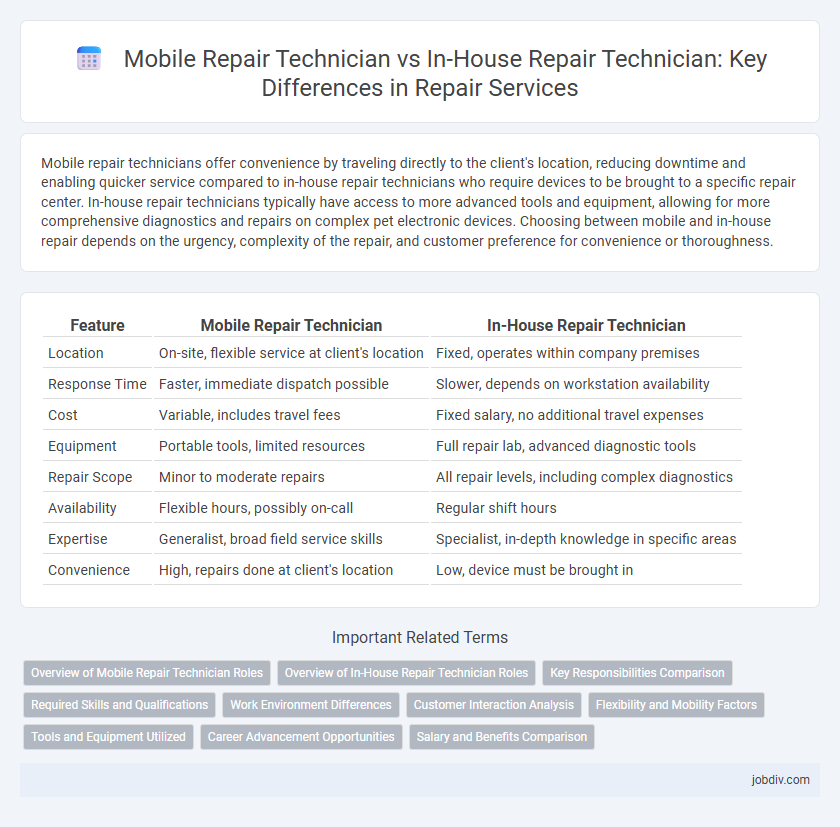Mobile repair technicians offer convenience by traveling directly to the client's location, reducing downtime and enabling quicker service compared to in-house repair technicians who require devices to be brought to a specific repair center. In-house repair technicians typically have access to more advanced tools and equipment, allowing for more comprehensive diagnostics and repairs on complex pet electronic devices. Choosing between mobile and in-house repair depends on the urgency, complexity of the repair, and customer preference for convenience or thoroughness.
Table of Comparison
| Feature | Mobile Repair Technician | In-House Repair Technician |
|---|---|---|
| Location | On-site, flexible service at client's location | Fixed, operates within company premises |
| Response Time | Faster, immediate dispatch possible | Slower, depends on workstation availability |
| Cost | Variable, includes travel fees | Fixed salary, no additional travel expenses |
| Equipment | Portable tools, limited resources | Full repair lab, advanced diagnostic tools |
| Repair Scope | Minor to moderate repairs | All repair levels, including complex diagnostics |
| Availability | Flexible hours, possibly on-call | Regular shift hours |
| Expertise | Generalist, broad field service skills | Specialist, in-depth knowledge in specific areas |
| Convenience | High, repairs done at client's location | Low, device must be brought in |
Overview of Mobile Repair Technician Roles
Mobile repair technicians specialize in on-site troubleshooting and fixing of smartphones, tablets, and other portable devices, offering convenience by eliminating the need to visit a physical store. They possess expertise in diagnosing hardware and software issues, performing component replacements, and ensuring quick turnaround times to minimize customer downtime. Equipped with portable tools and diagnostic software, these professionals adapt to diverse environments while maintaining service quality comparable to in-house repair centers.
Overview of In-House Repair Technician Roles
In-house repair technicians specialize in diagnosing and fixing device issues within a company's premises, ensuring quick turnaround and maintaining consistent quality control. They handle a wide range of repairs including hardware replacement, software troubleshooting, and system upgrades tailored to company standards. Their role requires familiarity with the specific devices used by the organization and adherence to internal protocols for security and data privacy.
Key Responsibilities Comparison
Mobile Repair Technicians specialize in on-site diagnostics, troubleshooting, and repairing devices directly at the customer's location, emphasizing flexibility and quick response times. In-House Repair Technicians operate within a designated workshop or service center, focusing on detailed inspections, component replacements, and comprehensive testing using specialized tools and equipment. Both roles require expertise in hardware and software repair, but mobile technicians prioritize portability and customer interaction, while in-house technicians handle more complex repairs and quality control processes.
Required Skills and Qualifications
Mobile repair technicians require strong diagnostic skills, proficiency with portable tools, and the ability to work independently in diverse environments. In-house repair technicians need expertise in comprehensive hardware and software troubleshooting, familiarity with specialized repair equipment, and effective communication skills for collaborating with team members. Both roles demand certifications such as CompTIA A+ or equivalent technical training to ensure competence in handling complex repair tasks.
Work Environment Differences
Mobile repair technicians operate in diverse environments such as homes, offices, and remote locations, requiring adaptability to varying conditions and limited tool availability. In-house repair technicians work within structured workshop settings equipped with specialized tools and consistent access to resources, enabling systematic diagnostics and repairs. The mobile role demands strong problem-solving skills on-the-go, while in-house positions emphasize routine processes and stable workspaces.
Customer Interaction Analysis
Mobile repair technicians often engage directly with customers at their location, providing personalized service and immediate feedback, which enhances customer satisfaction and trust. In-house repair technicians typically communicate through scheduled appointments or service desks, allowing for more structured interaction and detailed diagnostic explanations. This difference in customer interaction impacts repair transparency, turnaround time expectations, and overall client experience.
Flexibility and Mobility Factors
Mobile repair technicians offer unparalleled flexibility by traveling directly to customer locations, reducing downtime and enhancing convenience. In-house repair technicians provide consistent availability within a fixed workspace but lack the mobility to address off-site repair needs promptly. The choice between the two hinges on balancing on-site responsiveness against centralized, controlled service environments.
Tools and Equipment Utilized
Mobile repair technicians rely on portable diagnostic tools, multimeters, and compact soldering kits to perform efficient repairs on-site, enabling flexibility and quick response times. In-house repair technicians utilize advanced bench equipment such as oscilloscopes, specialized micro soldering stations, and comprehensive testing rigs for precise diagnostics and complex component replacements. The choice of tools directly impacts repair accuracy and turnaround time, with mobile setups favoring mobility and in-house setups providing extensive technical capabilities.
Career Advancement Opportunities
Mobile repair technicians benefit from diverse hands-on experience across various devices and environments, accelerating skill development and adaptability. In-house repair technicians often have structured career paths within a single company, providing stability and opportunities for specialization or managerial roles. Both positions offer distinct career advancement opportunities, with mobile roles favoring breadth of expertise and in-house roles emphasizing depth and organizational growth.
Salary and Benefits Comparison
Mobile repair technicians typically earn a competitive salary due to their flexibility in servicing multiple clients and locations, often supplemented by travel allowances and performance bonuses. In-house repair technicians usually receive a steady salary with additional benefits like health insurance, paid leave, and retirement plans, reflecting their long-term commitment to a single employer. Benefits packages and earning potential vary significantly between mobile and in-house roles based on experience, company size, and geographic location.
Mobile Repair Technician vs In-House Repair Technician Infographic

 jobdiv.com
jobdiv.com